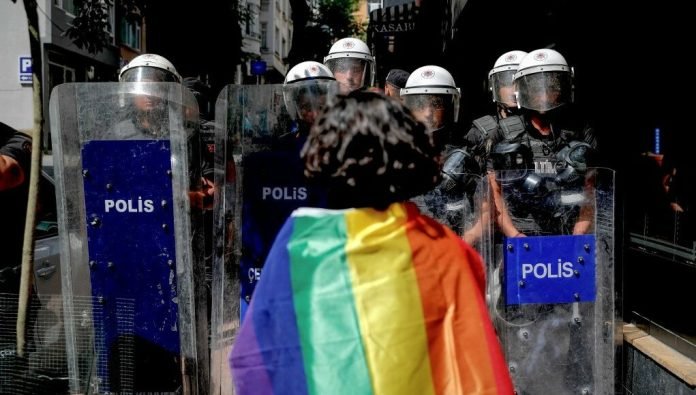Twenty-two human rights organizations have in a joint statement called on the Turkish government to avoid blanket bans and other discriminatory restrictions on Pride Month activities and to stop criminalizing them, Turkish Minute reported, citing Deutsche Welle Turkish edition.
June is celebrated as Pride Month in Turkey and around the world where LGBTI people hold marches, protests and other activities to demand greater rights and an end to discriminatory practices.
However, Turkish authorities have been imposing bans on such activities since 2015, despite the fact that homosexuality is not illegal in Turkey.
The rights organizations, which are members of the Solidarity Network for Human Rights Defenders, said in their statement that the Turkish government has been trying to criminalize LGBTI advocacy and the use of the rainbow flag, a symbol of LGBTI people, since 2015 through blanket bans.
Recalling the recent detention of 10 LGBTI activists who wanted to a hold a Pride march in Eskişehir over the weekend despite a ban from the governor’s office, the rights groups called on the government to respect LGBTI activists’ right to peaceful assembly and freedom of association.
They said the activists, not the governor’s offices, have the right to decide where they will hold a demonstration.
The group said the police intervention in the Eskişehir Pride march, which was the first in Pride Month 2024, was aimed at intimidating other LGBTI activists who are planning to hold similar marches in other cities.
The statement called for the launch of investigations into the law enforcement officers who prevent Pride Month events and detain activists unlawfully.
The rights groups also called on Turkish authorities, the interior ministry in particular, to fulfill their obligations regarding the right to peaceful assembly and freedom of association guaranteed in the Turkish Constitution and the international treaties Turkey is a party to.
Among the signatories of the statement were Civil Rights Defenders, the Research Institute on Turkey, the Turkey branch of Amnesty International, the Human Rights Association İstanbul branch, the Media and Law Studies Association and the LGBTI Solidarity Association.
LGBTI+ groups in the past have gone ahead with their plans to hold their marches despite the bans, which sometimes leads to confrontations with the police and detention of the participants.
There have also been instances when the attendees faced criminal charges for “participating in an unlawful assembly” or “failing to disperse despite being warned” and up to three years in prison for taking part in Pride marches.
Amnesty International also warned in a statement on May 17 on the occasion of the International Day Against Homophobia, Biphobia and Transphobia (IDAHOBIT), that there must be no repeat of the discrimination and violence meted out to Pride participants in Turkey last year.
“As we approach Pride month there must be no repeat of the draconian restrictions, disproportionate violence and hateful official rhetoric that we witnessed last year,” said Amnesty International’s deputy regional director for Europe, Dinushika Dissanayake.
“Instead, authorities should ensure LGBTI Pride marches in Türkiye go ahead safely and without the interference and intimidation of previous years.”
There was widespread use of unnecessary and arbitrary force against peaceful protesters resulting in at least 224 people in 2023 being detained across the country. The detainees included lawyers and journalists as well as people who were not participating in the Pride events.
Homosexuality is not illegal in Turkey, but homophobia is widespread. After a spectacular Pride March in İstanbul drew 100,000 people in 2014, the Islamic-rooted Justice and Development Party (AKP) government responded by banning future events in the city, citing security concerns.
It is common for Turkish President Recep Tayyip Erdoğan and other politicians from the AKP to attack LGBTI+ individuals and accuse them of perversion and ruining family values.
Turkey was ranked 48th among 49 countries as regards the human rights of LGBT people, according to the 2023 Rainbow Europe Map published by the International Lesbian, Gay, Bisexual, Trans and Intersex Association (ILGA)-Europe.















